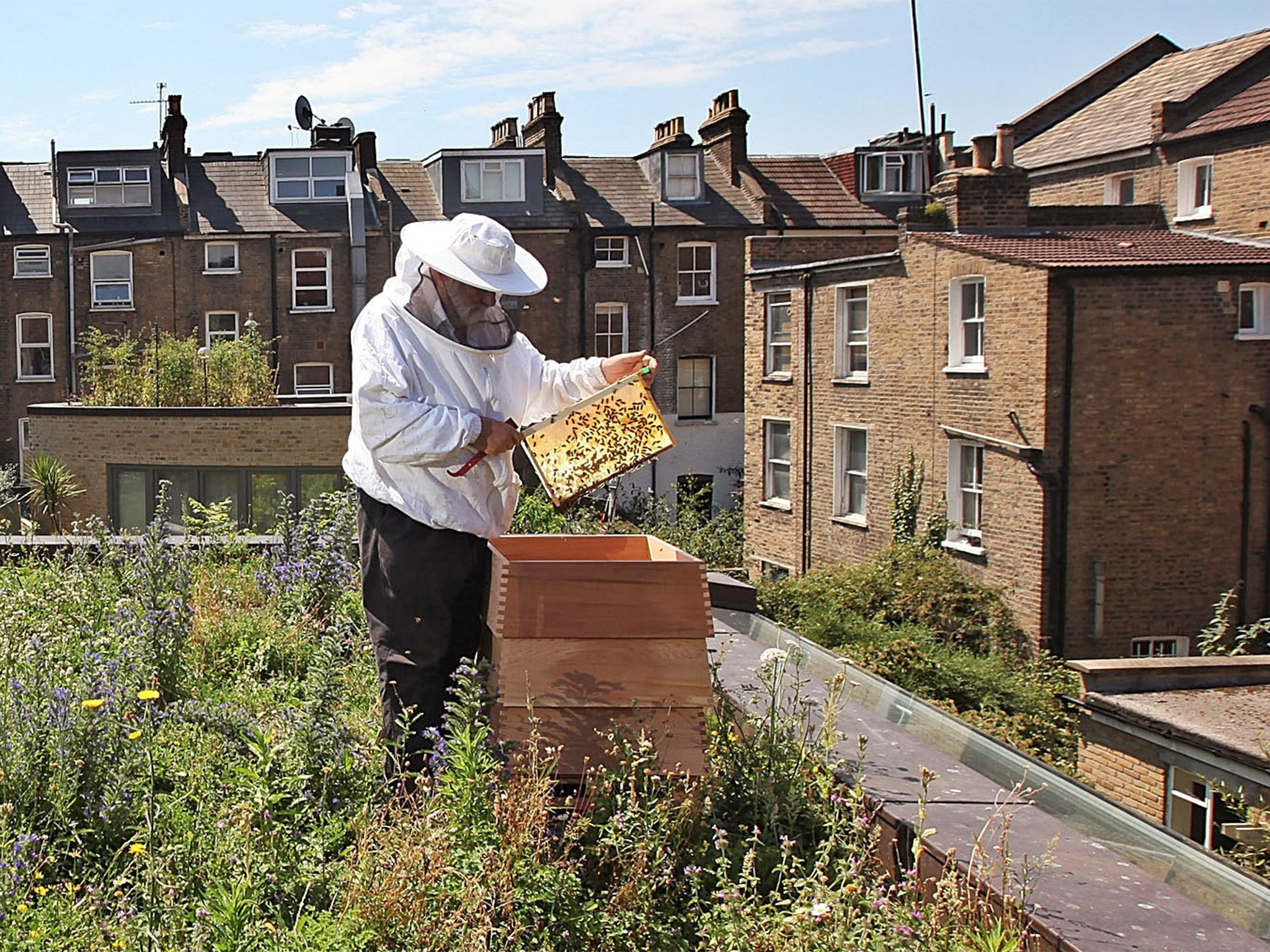Trend for owning beehives in London is bad for insects and birds, say researchers
Beehives, which are top of John Lewis's wedding gift list, are leading to excess urban bee populations

Your support helps us to tell the story
From reproductive rights to climate change to Big Tech, The Independent is on the ground when the story is developing. Whether it's investigating the financials of Elon Musk's pro-Trump PAC or producing our latest documentary, 'The A Word', which shines a light on the American women fighting for reproductive rights, we know how important it is to parse out the facts from the messaging.
At such a critical moment in US history, we need reporters on the ground. Your donation allows us to keep sending journalists to speak to both sides of the story.
The Independent is trusted by Americans across the entire political spectrum. And unlike many other quality news outlets, we choose not to lock Americans out of our reporting and analysis with paywalls. We believe quality journalism should be available to everyone, paid for by those who can afford it.
Your support makes all the difference.Haven't times changed? According to John Lewis, after an unhealthily long obsession with toasters and towels, its wedding-gift list has hit a sweet spot: the top request is now for a beehive. And not just any beehive. This one is eco-friendly and, at just £20, a somewhat more austerity-friendly choice than the smart TVs for up to £3,000 that are also popular.
This trend nicely unpicks the hackneyed image of Bridezilla and her groom. Instead of loading up with glistening crystal and shimmering silverware, it turns out that today's right-on newlyweds have one eye on declining bee populations and the other on the health benefits of eating local honey.
Good news for Camilla Goddard, who runs Capital Bee. She looks after around 70 hives in London – including at the Old Bailey, the Garrick Club, schools and hotels – and once fulfilled an order for hundreds of little bottles of honey to be given away as wedding favours. "I get a lot of people on my courses who are there because their partners have bought a hive for them as a romantic gift," she says.
Camilla set up Capital Bee 10 years ago and has watched our hive-brain develop in the interval. By how much becomes clear from data released by BeeBase – a resource for beekeepers run by the UK's National Bee Unit – which correlates with the John Lewis news. It shows that, in the five years from 2008 to 2013, the number of beekeepers in Greater London tripled from 464 to 1,237. Meanwhile, hive numbers doubled to more than 3,500 from 1,677.
The good life? As it happens, and in the true style of the eponymous TV series, the garden-owning couples who request beehives on their wedding lists and think they're rebalancing the world's apian problems turn out to be environmental vandals. There are 10 times more hives per square kilometre in London than in rural Britain, and researchers from the University of Sussex claim this sudden onslaught of urban bees has led to colony competition, the spread of bee diseases, and the exhaustion of flower supplies on which other insects – and, therefore, birds – live.
Not so, says Goddard. This swell of keepers doesn't spell disaster at all; they simply need training. "Typically," she says, "beekeepers become much better at it after a few years. What we've got is a very ancient craft suddenly popular in a modern urban environment, and there's been a knowledge gap, which is gradually closing. More people now have the experience to mentor other keepers."
One thing these mentors might suggest is to stop putting hives on tower-block roofs. (Some pundits claim that the bees expend so much energy in ascending flight that they're not up to keeping the hive fed.) But Goddard says it isn't so much the height of the site as the area of the city that most affects how well bees do. In London, for example, they thrive in such districts as Kensington and Notting Hill, blessed with big gardens and lots of flowers full of tasty pollen. And in fact, a study in The Biologist journal advises that, to help bees, you should plant flowers instead of buying hives. "Look at it holistically," counsels Goddard. Consider year-round flowering, not just June and July, and think about trees. (Apparently, councils can choose from a list of around 35 trees, so it would be great if they started to pick a bee-friendly species, such as limes.)
That's all very well, but there's another issue – and if you've seen the film My Girl, you'll be recoiling now. These newbie keepers are clueless when it comes to one of the sharper points of apiary, namely swarming – which has led to an explosion in town centres. This process happens in spring, often following the birth of a new queen bee. The old queen, dethroned, leaves with some loyal workers and settles out in the open – perhaps on your front gate – while searching for a suitable home. Which is when you ring the British Beekeepers Association (BBKA) and ask if a volunteer can come and collect them.
Goddard warns we might see early swarming this year, given the mild winter. She's looking out for the bees and worries if she sees them in a difficult, vulnerable spot, such as clinging to a washing-line post. I worry more for the happy couple to whom they will have "belonged". Still, maybe the humans will stick together. Once their bees have swarmed next door, there's little chance any extra-marital affection will bloom over the garden fence.
Join our commenting forum
Join thought-provoking conversations, follow other Independent readers and see their replies
Comments